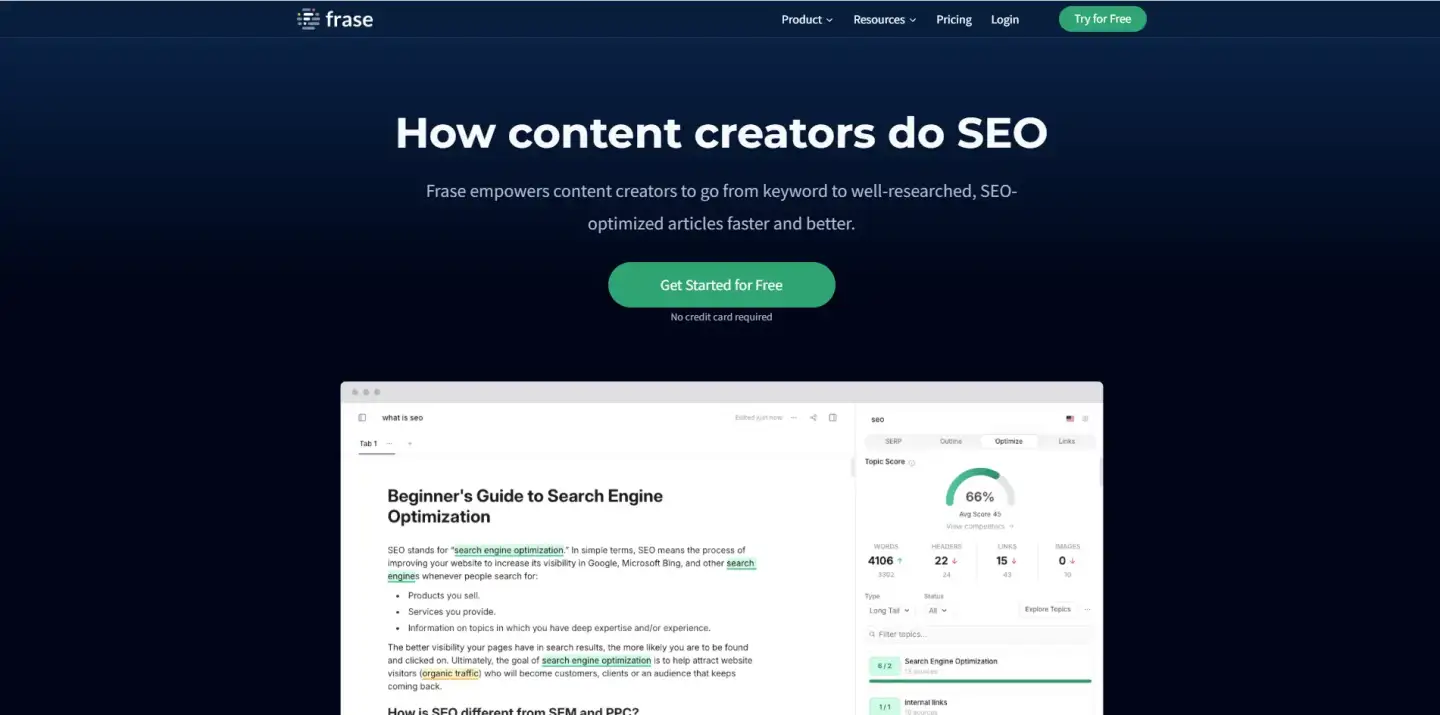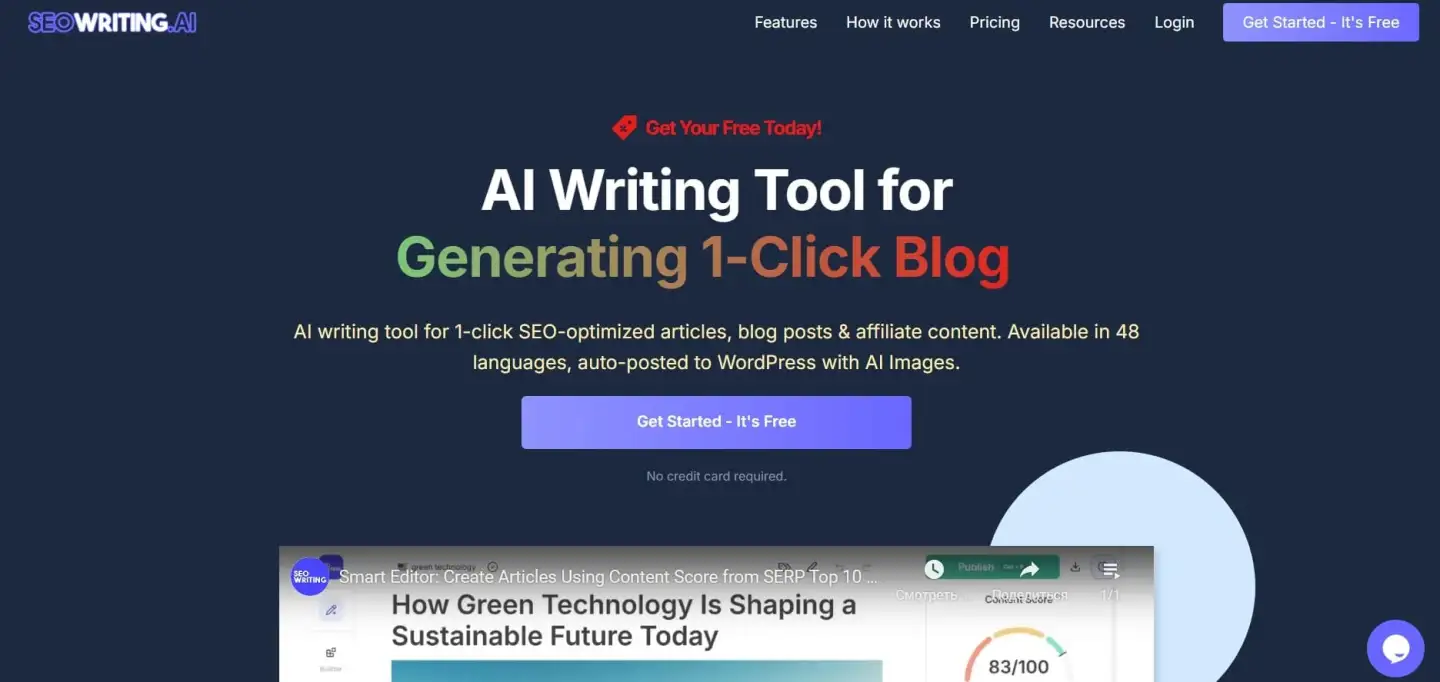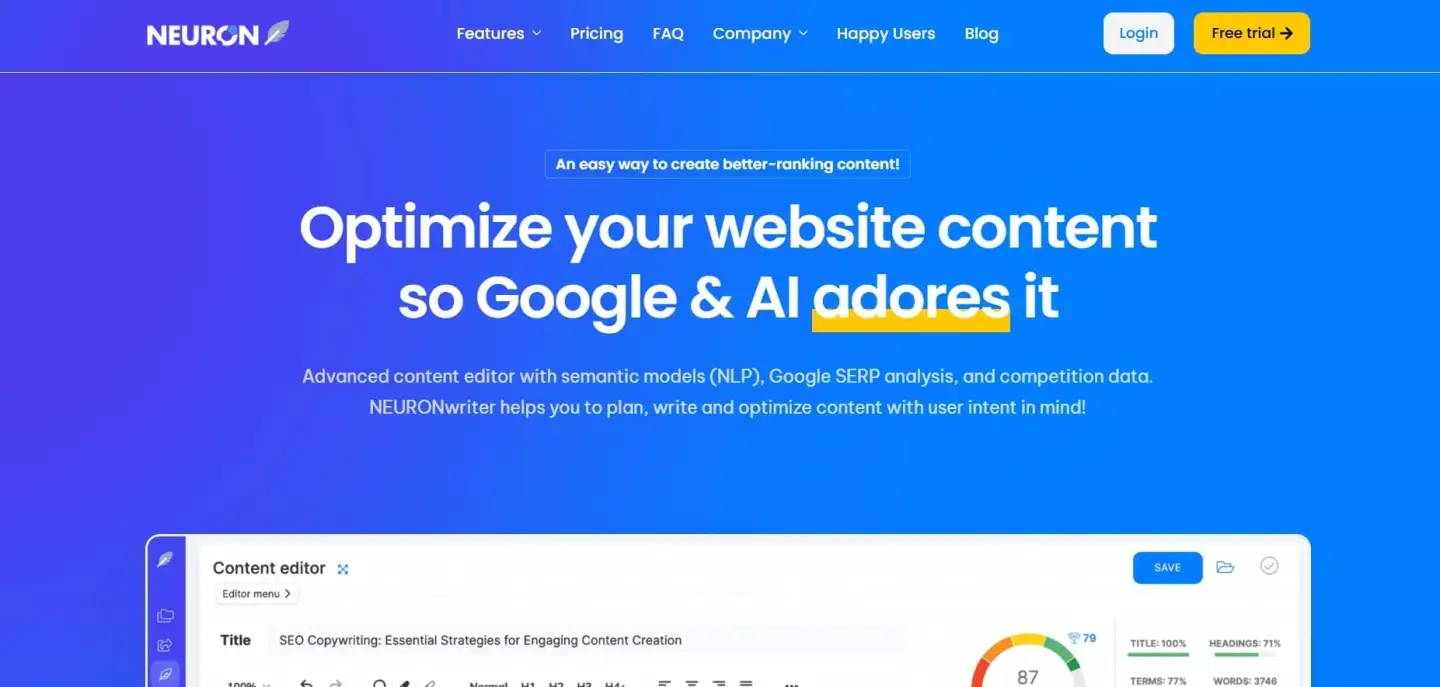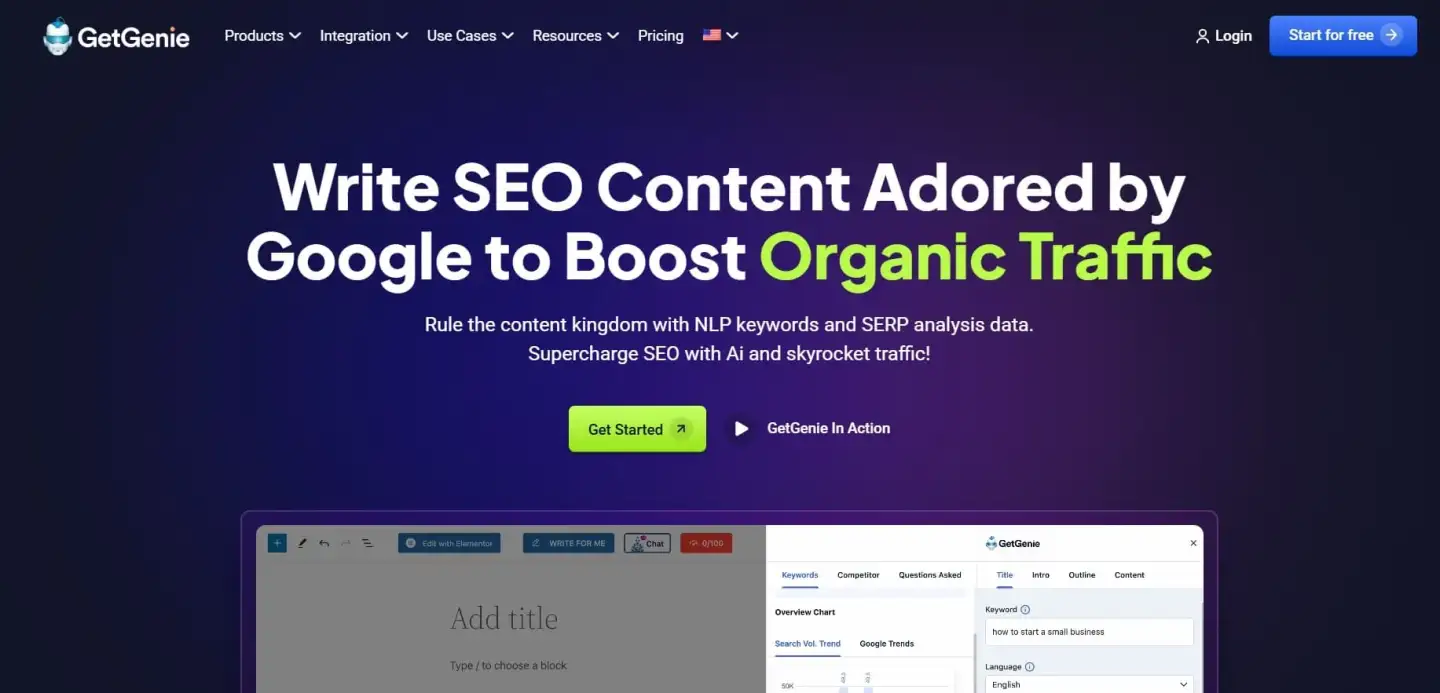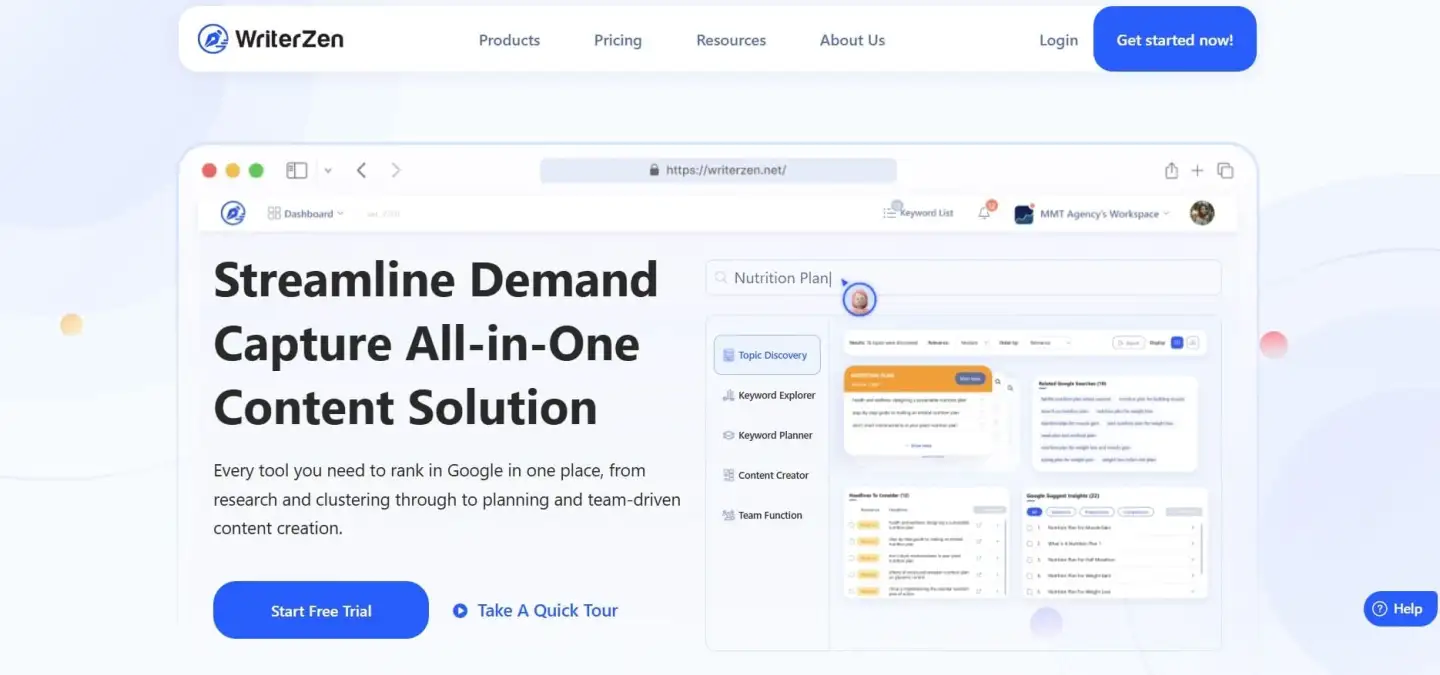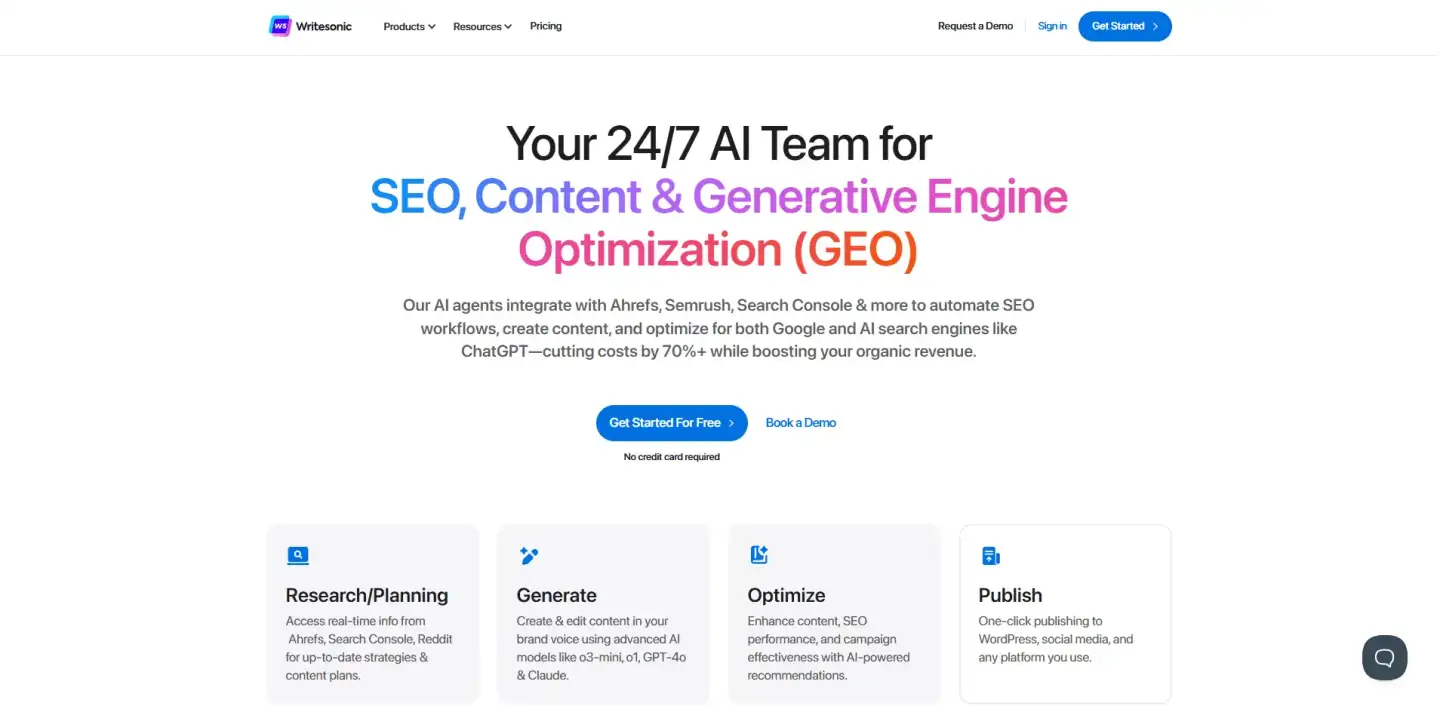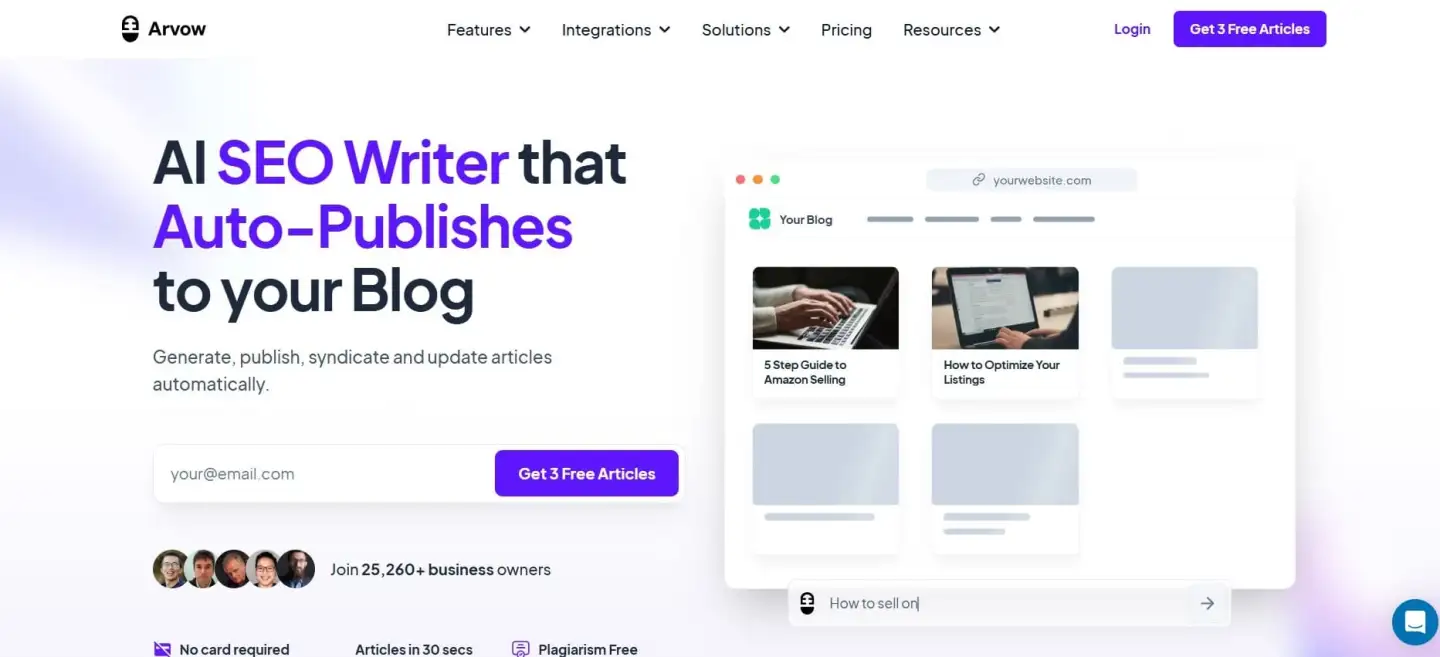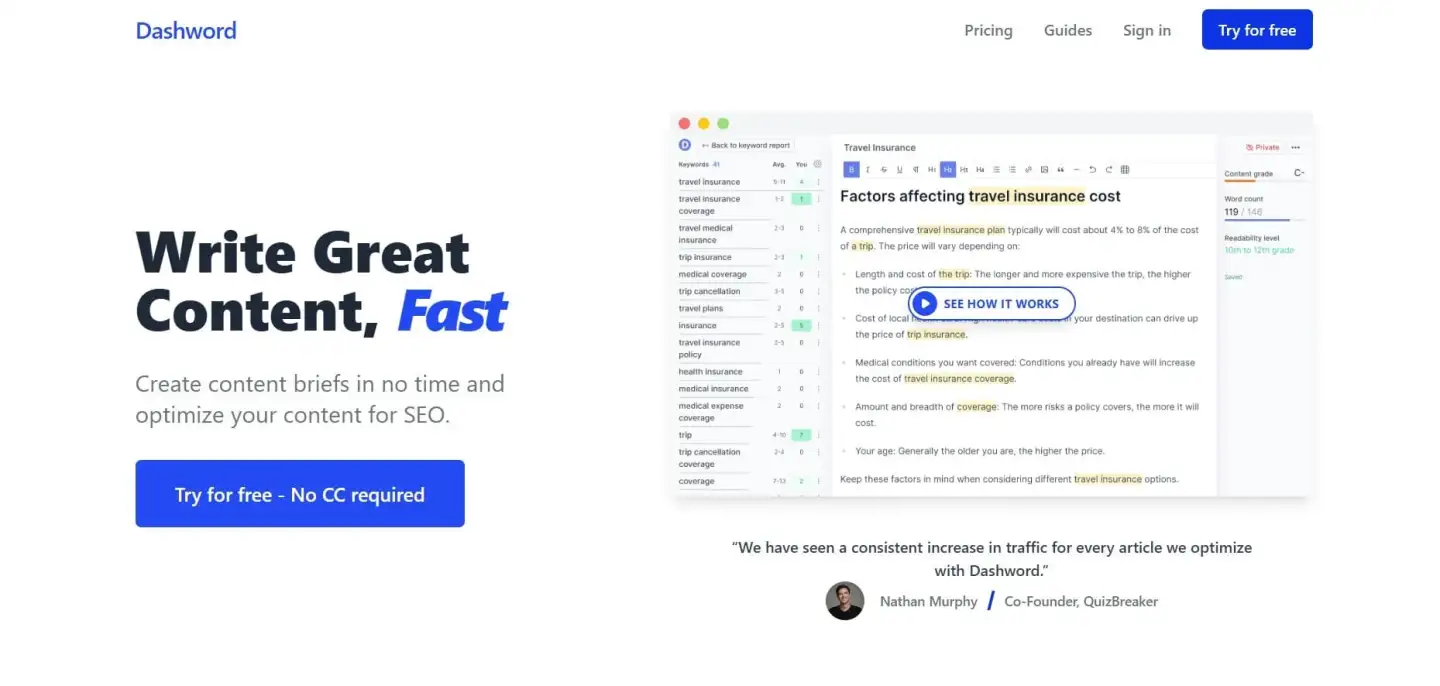Your search for Scalenut alternatives indicates you are evaluating different options to determine which ones suit your budget and workflow and meet your SEO goals. The free tier of Scalenut does not last long because its pricing structure becomes expensive when users need more features beyond the basic plan (Starter costs $39/month and Growth costs $79/month). The combination of credit restrictions and a user interface designed for solo creators leads marketers and agencies to seek alternative content marketing platforms to Scalenut.
This guide evaluates the top Scalenut alternatives for 2025 by examining their features alongside practical applications and unexpected expenses to help you select the most suitable replacement for your team. Let’s dive in.
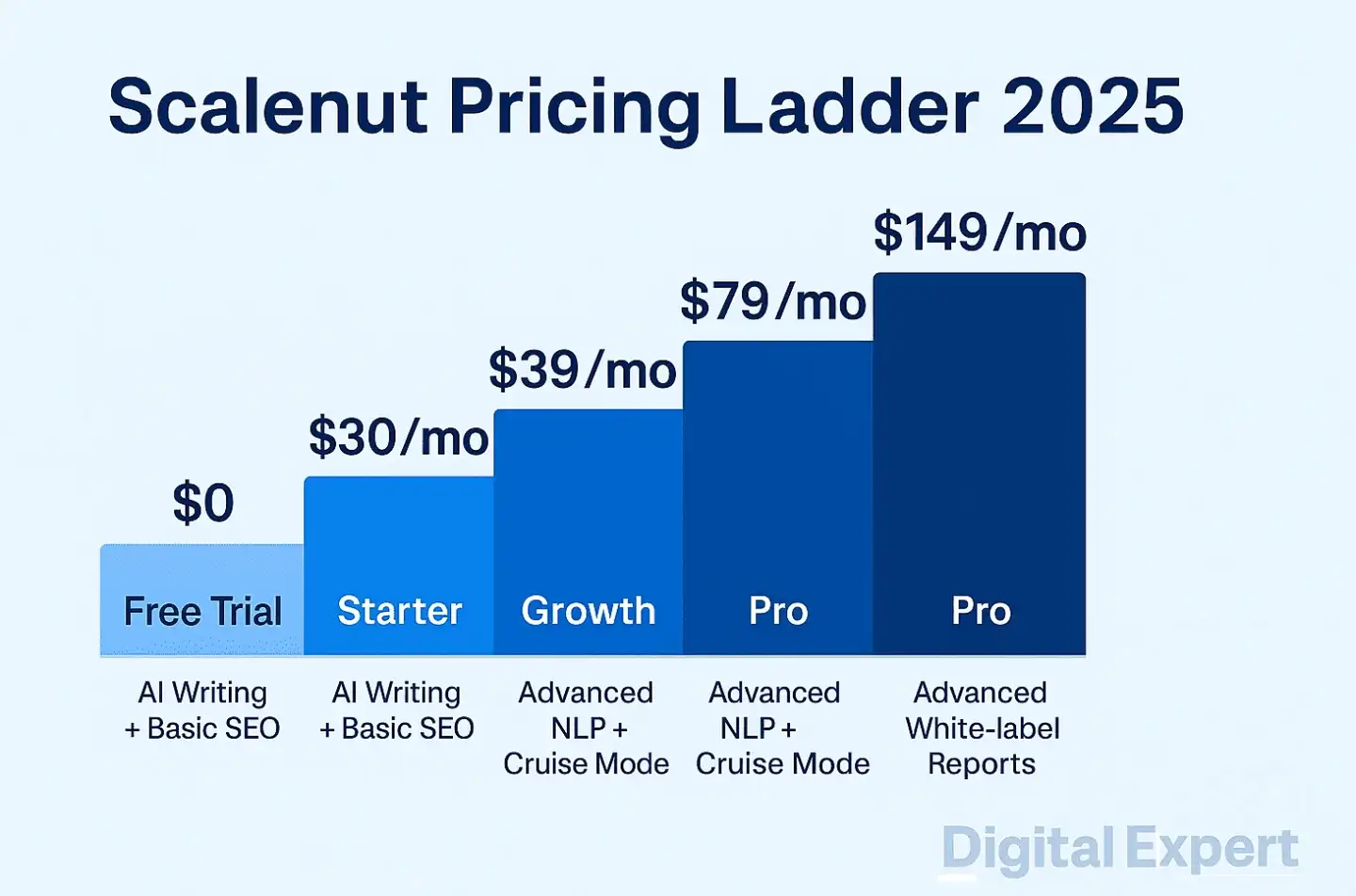
TL;DR — quick picks
Need the highlights fast? Here’s a cheat-sheet of the best Scalenut alternatives and what each one does better than the rest. These picks cover every budget and use-case, so you can jump straight to the Scalenut competitor that fits your stack of AI writing tools.
Quick pick |
Why it wins |
Starter price* |
|---|---|---|
Best overall blend of SEO content optimization and AI writing |
$15/mo |
|
Sharpest NLP insights for on-page scoring |
$19/mo |
|
Top choice for teams + topic-cluster maps |
$27/mo |
|
Best budget alternative to Scalenut (unlimited chars) |
$9/mo |
|
Versatile multilingual copy machine |
$16/mo |
|
Lean SERP content score with auto-updates |
$39/mo |
*Monthly rates at the time of writing—check each site for current Scalenut pricing comparisons.
Snapshot comparison table
A one-screen look at the best Scalenut alternatives—handy when you need to line up features and pricing before diving deeper into each Scalenut competitor.
Tool |
AI / SEO edge |
Entry price (mo.) |
Free plan? |
Ideal for |
|---|---|---|---|---|
Frase |
SERP briefs + content score updates |
$15 |
Yes (7-day) |
Solo SEOs |
SEOWriting |
Auto-outline ➜ draft ➜ optimize loop |
$16 |
Limited |
Niche-site builders |
NeuronWriter |
Deep NLP terms & competitor gap |
$19 |
No |
Tech blogs |
GetGenie |
WordPress / WooCommerce native AI |
$19 |
Yes (1 000 words) |
WP shops |
GravityWrite |
80+ copy templates & voice tones |
$19 |
Yes (2 000 chars) |
Growth hackers |
WriterZen |
Topic clusters + keyword research |
$27 |
No |
Content teams |
Writesonic |
25+ languages, brand-voice cloning |
$16 |
Yes (10 000 words) |
Multilingual sites |
TryJournalist |
Long-form editor with citations |
$29 |
No |
Thought-leadership posts |
Rytr |
Budget-friendly unlimited generation |
$9 |
Yes (10 000 chars) |
Freelancers |
Dashword |
Auto-refreshing SERP content scores |
$39 |
Yes (1 project) |
Agencies |
Prices captured April 2025; check each vendor for current deals and Scalenut pricing benchmarks.
What is Scalenut & why look elsewhere?
Scalenut bundles an AI copy engine with on-page intelligence: Cruise Mode spits out long-form drafts, while its Topic Cluster generator maps inter-linked articles around a single intent. Add the real-time NLP editor and you get solid SEO content optimization inside one dashboard—no extra extensions or spreadsheets required.
Yet even devoted users admit a few speed bumps. Scalenut pricing jumps sharply between the Starter and Growth tiers, and credit ceilings can halt large-scale briefs halfway through an editorial calendar. Collaboration is single-project by design, leaving multi-brand agencies juggling separate workspaces, and the toolset leans hard into blog posts rather than broader content marketing platforms needs like social snippets or ad copy. Throw in language coverage that still trails some rising AI writing tools, and it’s clear why search volume for “scalenut alternatives” keeps climbing.

If any of those limits sound familiar, scanning today’s Scalenut competitors—from budget-first Rytr to data-rich NeuronWriter—may uncover an alternative to Scalenut better matched to your workflow and wallet.
Methodology — how we selected the 10 tools
To shortlist ten contenders we started with a data scrape of 40 + AI writing tools and content marketing platforms mentioned in Reddit r/SEO, IndieHackers, and Product Hunt threads posted since January 2025. Each tool then faced a five-point filter:
Search performance – It had to rank for at least one page-one keyword pairing such as “alternative to Scalenut” or “SEO content optimization software.”
Feature mix vs Scalenut – We looked for functionality Scalenut lacks (live SERP refresh, WordPress plug-ins, multilingual drafting, unlimited words), not just carbon-copy editors.
Transparent pricing – Clear, publicly listed plans under $50/month for entry tiers, allowing a fair head-to-head with Scalenut pricing.
User-reported ROI – We analysed G2, Capterra, and Twitter case threads for quantifiable wins: time saved, traffic lifts, or cost drops. Star ratings alone didn’t cut it.
Road-map velocity – Tools needed a proven cadence of meaningful updates in the last nine months—shipping new NLP models, not just UI polish.
Only products meeting all five hurdles—Frase, SEOWriting, NeuronWriter, GetGenie, GravityWrite, WriterZen, Writesonic, Arvow (TryJournalist), Rytr, and Dashword—made the final cut as the best Scalenut alternatives worthy of deep-dive review.
1. Frase
Frase positions itself as an AI brief architect that pulls live SERP data into the writing flow. Authors get an outline, question clusters, and a content-score gauge in one panel—making it a top pick among Scalenut competitors for speed of research. The interface is lean, so you’re drafting rather than tab-hopping.
Stand-out features
Real-time SERP gap map
Automatic FAQ extraction
AI writer trained on top-20 rivals
Pros |
Cons |
|---|---|
Deep SERP scraping |
No bulk project cloning |
Content score updates as you type |
Limited collaboration seats on lowest tier |
Pricing
Solo plan: $15/month (4 articles)
Basic: $45/month (30 articles)
Team add-ons: +$25 per seat
Ideal use-cases
Refreshing aging how-to guides
Briefing freelance writers fast
Building FAQ hubs that rank
Mini case study
A niche tech blog swapped Scalenut for Frase and cut brief creation from 30 minutes to 8, pushing out 12 extra posts per month without extra headcount.
2. SEOWriting
SEOWriting strings together outline, draft, and optimisation phases in a single scroll—turning keyword lists into first drafts in under five minutes. Its template logic leans on Google NLP entities, giving it an edge as an alternative to Scalenut for entity-rich copy.
Stand-out features
“One-click article” workflow
Entity density meter
Auto-internal-link suggestions
Pros |
Cons |
|---|---|
Fastest first-draft engine in tests |
UI feels cluttered on small screens |
Clear entity gap recommendations |
No teamwork permissions yet |
Pricing
Starter: $16/month (25 000 words)
Pro: $29/month (unlimited)
Ideal use-cases
Building niche-site content libraries
Quick product-led blog posts
Affiliate reviews that need entity coverage
A mattress-review affiliate adopted SEOWriting and lifted time-on-page 22 % by expanding entity coverage their old Scalenut drafts missed.
3. NeuronWriter
NeuronWriter is obsessed with semantics: it mines Google’s NLP API plus competitors’ headings to surface term importance scores. For writers chasing concrete optimisation cues rather than generic suggestions, it’s often the best Scalenut alternative on the market.
Stand-out features
Term importance heat-map
Multi-language SERP analysis
YouTube transcription importer
Pros |
Cons |
|---|---|
Unmatched NLP depth |
Learning curve for new users |
“Ideas” tab surfaces unused subtopics |
No built-in image generator |
Pricing
Bronze: $19/month (2 projects)
Silver: $37/month (5 projects)
Lifetime deals pop up twice a year
Ideal use-cases
Expert round-ups needing semantic breadth
Content gap audits for agencies
Translating winning pages into new markets
Mini case study
An e-commerce SaaS rewrote 15 onboarding articles via NeuronWriter; organic sign-ups rose 18 % within eight weeks versus Scalenut-optimised versions.
4. GetGenie
GetGenie lives inside WordPress and WooCommerce, auto-filling meta tags, FAQs, and even product descriptions without leaving the CMS. That tight native feel makes it a pragmatic Scalenut alternative for site owners who hate juggling tabs.
Stand-out features
WP block editor sidebar
One-click Woo description writer
Competitor SERP sketch in draft mode
Pros |
Cons |
|---|---|
Zero setup—just a plug-in |
Works only on WordPress |
Rich WooCommerce hooks |
Limited long-form controls |
Pricing
Genie Lite: Free (2 000 words)
Writer: $19/month (12 000 words)
Pro: $49/month (unlimited)
Ideal use-cases
Updating Woo product pages in bulk
Publishing store blogs without exporting HTML
Speedy meta tag generation
Mini case study
A lifestyle store swapped from Scalenut to GetGenie, pushing 400 refreshed product descriptions live in a weekend; bounce rate on PDPs fell 9 %.
5. GravityWrite
GravityWrite banks on variety: 80+ templates, emotion-tuning sliders, and voice modes spanning “empathetic” to “hard-sell.” While Scalenut covers long-form well, GravityWrite fills the micro-copy void—ads, captions, headlines—inside wider content marketing platforms.
Stand-out features
Tone slider with preview
25-language switcher
Brand-voice memory
Pros |
Cons |
|---|---|
Broad template catalogue |
SEO scoring is basic |
Affordable unlimited words |
Lacks bulk export |
Pricing
Free: 2 000 characters/day
Pro: $19/month (unlimited)
Ideal use-cases
Social media calendars
A/B headline testing
Email pre-headers
Mini case study
A DTC skincare brand added GravityWrite to handle Instagram captions; engagement lifted 14 % while Scalenut remained for long-form.
6. WriterZen
WriterZen marries keyword discovery, topic clustering, and an editor—so content teams move from market research to publish-ready draft without switching tools. It suits strategists who feel Scalenut’s keyword module is too surface-level.
Stand-out features
Keyword Golden Ratio filter
SERP Insights timeline
Cluster map visualiser
Pros |
Cons |
|---|---|
Strong research → writing hand-off |
Credits expire monthly |
Sharable cluster mind-map |
Editor lacks Grammarly-style tone feedback |
Pricing
Standard: $27/month (50 clusters)
Advanced: $41/month (150 clusters)
Ideal use-cases
Building pillar + cluster road-maps
Agency keyword pitches
Quarterly content audits
Mini case study
A SaaS agency replaced Scalenut’s keyword tool with WriterZen and cut discovery time for 30-page clusters from 10 hours to 3.
7. Writesonic
Writesonic’s USP is language breadth and voice cloning. A single draft can flip into 25 tongues in seconds while retaining brand tone—something Scalenut still struggles with. That makes it a high-impact Scalenut competitor for global sites.
Stand-out features
Brand Voice Builder
25-language instant translation
Chatsonic GPT-powered assistant
Pros |
Cons |
|---|---|
Multilingual parity |
Credits drain quickly on long docs |
Voice consistency across formats |
UI occasionally lags |
Pricing
Starter: Free (10 000 words)
Unlimited: $16/month
Business: $20+/month (seat-based)
Ideal use-cases
Translating landing pages
Generating PPC variants in bulk
Customer-support article localisation
Mini case study
An EU tech blog shifted FAQs to Writesonic; organic traffic from Spain and Germany doubled in a quarter, beating prior Scalenut translations.
8. Arvow (TryJournalist)
Arvow (TryJournalist) targets thought-leadership: long-form pieces laced with auto-generated citations that link back to original sources. It pitches itself as an ethical answer to thin AI posts—making it a distinctive alternative to Scalenut.
Stand-out features
Citation autofill (APA / MLA)
Interview-style prompt mode
Fact-check pass before export
Pros |
Cons |
|---|---|
Built-in citation engine |
Pricing on the higher side |
Fact-checking stage reduces edits |
Smaller template library |
Pricing
Pro: $29/month (unlimited articles)
Team: $59/month (3 seats)
Ideal use-cases
Guest posts on high-authority sites
White papers that need source depth
CEO ghost-writing
Mini case study
A B2B agency produced a 2 800-word cloud-security report via Arvow (TryJournalist); publication on Forbes Tech Council sailed through editorial with zero plagiarism flags—previous Scalenut drafts needed heavy manual sourcing.
9. Rytr
Rytr’s claim to fame is cost: unlimited characters for less than a Spotify subscription. That price point alone makes it the go-to budget entry in any list of Scalenut alternatives.
Stand-out features
Unlimited generation on Saver & Unlimited plans
Tone presets (20+)
Simple project folders
Pros |
Cons |
|---|---|
Cheapest unlimited tier |
No SERP insights |
Snappy, distraction-free editor |
Thin integrations list |
Pricing
Free: 10 000 characters/month
Saver: $9/month (unlimited)
Unlimited: $29/year (!) when on sale
Ideal use-cases
Short-form ads and CTAs
Start-ups squeezing budgets
Quick email outreach drafts
Mini case study
A freelance copywriter swapped Scalenut for Rytr and saved $540/year while meeting the same monthly word quota for client blogs.
10. Dashword
Dashword tracks content scores after publication, refreshing SERP snapshots automatically—something Scalenut users must run manually. Agencies hunting for post-publish maintenance flag it as the smartest best Scalenut alternative for ongoing optimisation.
Stand-out features
Auto-refreshing SERP data
Alert system for score drops
Client-friendly share links
Pros |
Cons |
|---|---|
Hands-off monitoring |
Higher entry price |
White-label reports |
Writer lacks advanced GPT prompts |
Pricing
Starter: $39/month (5 pages)
Pro: $99/month (25 pages)
Agency: $249/month (unlimited)
Ideal use-cases
Retainer SEO maintenance
Surging pages that need freshness signals
Client transparency dashboards
Mini case study
A boutique SEO firm added Dashword to its stack; weekly refresh alerts helped secure five featured snippets previously lost with Scalenut-only workflows.
Feature matrix — side-by-side at a glance
Tool |
NLP / topic modeling |
Live SERP audit |
WordPress plug-in |
Multilingual draft |
Unlimited words tier |
Built-in citations |
Auto score refresh |
Keyword research |
Team seats |
Free plan |
|---|---|---|---|---|---|---|---|---|---|---|
Frase |
✔️ |
✔️ |
— |
🌐 |
— |
— |
— |
➖ (basic) |
✔️ |
7-day |
SEOWriting |
✔️ |
✔️ |
— |
🌐 |
✔️ |
— |
— |
— |
➖ |
Limited |
NeuronWriter |
🟢 Deep |
✔️ |
— |
🌐 |
— |
— |
— |
✔️ |
✔️ |
— |
GetGenie |
➖ |
✔️ |
✔️ Native |
🌐 |
— |
— |
— |
➖ |
✔️ |
1 K words |
GravityWrite |
➖ |
— |
— |
🌐 |
✔️ |
— |
— |
— |
➖ |
2 K chars |
WriterZen |
✔️ |
➖ |
— |
🌐 |
— |
— |
— |
🟢 Robust |
✔️ |
— |
Writesonic |
✔️ |
➖ |
— |
🏆 25+ |
✔️ |
— |
— |
➖ |
➖ |
10 K words |
Arvow |
➖ |
✔️ |
— |
🌐 |
✔️ |
🏆 |
— |
— |
✔️ |
— |
Rytr |
➖ |
— |
— |
🌐 |
🏆 Cheapest |
— |
— |
— |
➖ |
10 K chars |
Dashword |
➖ |
✔️ |
— |
— |
— |
— |
🏆 Yes |
➖ |
✔️ |
1 project |
Legend: 🏆 = standout capability │ 🟢 = strongest in class │ ➖ = absent or basic
Pricing snapshot — who’s cheapest, who’s premium?
Money often decides which Scalenut competitors make the shortlist, so here’s a straight-up look at entry-level monthly fees. Use it to see whether an alternative to Scalenut truly saves cash or just shifts it.
Tool |
Starter price / mo |
Notes |
|---|---|---|
Rytr |
$9 |
Unlimited chars — lowest cost in this lineup |
Frase |
$15 |
4 article credits; add-on seats extra |
Writesonic |
$16 |
10 000 words free, then pay-as-you-grow |
SEOWriting |
$16 |
25 000-word cap on Starter |
NeuronWriter |
$19 |
NLP depth; 2 projects included |
GetGenie |
$19 |
WordPress plug-in + 1 000 free words |
GravityWrite |
$19 |
Unlimited words, 80+ templates |
WriterZen |
$27 |
Keyword research plus 50 clusters |
Arvow (TryJournalist) |
$29 |
Unlimited long-form with citations |
Dashword |
$39 |
5 live pages with auto-refresh |
Scalenut (Starter) |
$39 |
100,000 AI words + Cruise Mode |
A quick scan shows why “best Scalenut alternatives” searches spike: several rivals match Scalenut’s feature set while undercutting Scalenut pricing by 25–70 %. If raw cost tops your list, Rytr, Frase, and ai writing tools like Writesonic sit in the safe zone. Need enterprise polish? Dashword’s higher tag buys always-on SERP monitoring that Scalenut still lacks.
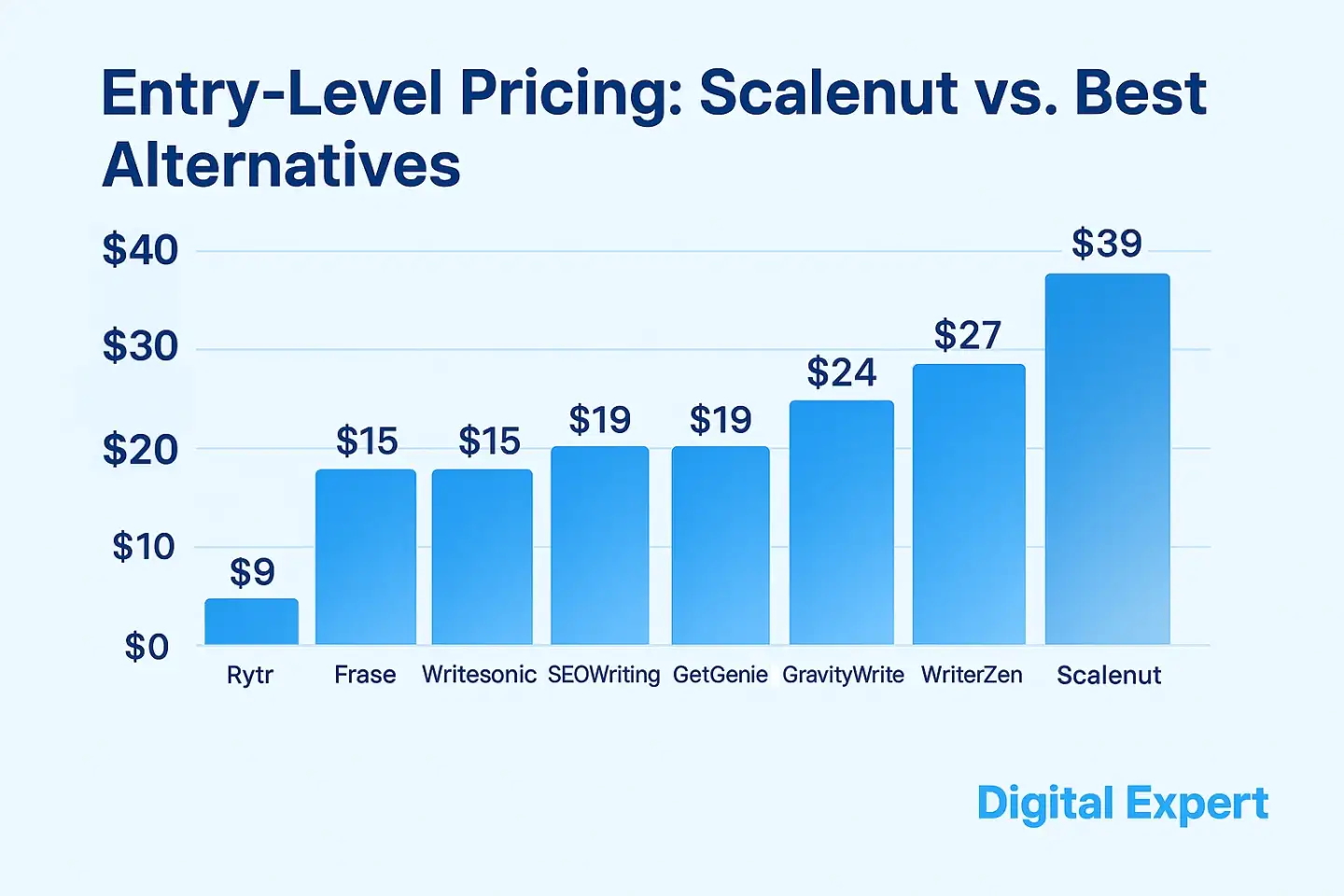
Choosing the right Scalenut alternative for your workflow
Every team measures value differently, so the best Scalenut alternative is the one that fills your specific gaps without creating new ones. Run these five filters before you swap tools:
True cost of scale
Don’t compare list prices in isolation; stack projected word counts or live-page needs against Scalenut pricing. Rytr looks like a steal until you add a separate SERP tool; Dashword’s higher fee may erase that extra bill.Depth of SEO intelligence
If your roadmap lives or dies on SEO content optimization, prioritise NeuronWriter’s NLP heat-maps or Frase’s real-time SERP refresh. Pure copy generators—great for slogans—won’t move organic rankings.Publishing surface
WordPress store? GetGenie bolts straight into the block editor. Managing multilingual landing pages? Writesonic covers 25 languages. The tighter the integration, the fewer logins and copy-paste loops.Collaboration overhead
Freelancers can thrive inside single-seat AI writing tools. Agencies need share links, granular permissions, and client-safe exports—areas where WriterZen and Dashword outshine other Scalenut competitors.Road-map momentum
Scan change-logs. An alternative to Scalenut shipping updates every month will likely keep pace with Google’s algorithm shifts; a stagnant editor could leave you chasing yet another set of Scalenut alternatives next quarter.
Run these checks in order—cost, SEO depth, integration fit, team needs, product velocity—and a clear front-runner usually emerges. Whether you lean toward research-heavy content marketing platforms like WriterZen or budget-first creators like Rytr, matching tool strengths to your workflow turns “shopping for tools” into “shipping content.”
Wrapping up the search for your next writing engine
Choosing between today’s Scalenut competitors boils down to matching needs—not hype. If granular SEO content optimization drives your roadmap, NeuronWriter or Frase will out-analyse Cruise Mode. When budget dictates every line item, Rytr’s unlimited tier beats Scalenut pricing by a mile. Agencies needing live performance checks lean on Dashword, while WordPress shops gravitate to GetGenie for native publishing.
The takeaway? Treat this list of the best Scalenut alternatives as a parts catalog. Pick a core editor that fixes Scalenut’s biggest gap for you—be it multilingual drafting, auto-refresh SERP data, or richer keyword discovery—and bolt on smaller AI writing tools only if a workflow hole remains. That modular mindset ensures the alternative to Scalenut you deploy today still fits once traffic surges and new channels appear.
Ready to experiment? Start two or three free trials, feed each with the same brief, and benchmark speed, on-page scores, and team feedback. Within a week you’ll know which contender is the best Scalenut alternative for your unique content engine—and your audience will feel the upgrade long before search bots do.
FAQs
Is there a completely free Scalenut alternative for long-form content?
Yes—Rytr offers a forever-free tier (10 000 characters) and GetGenie grants 1 000 free words inside WordPress. Both can handle basic blog posts, but they lack the deep NLP analysis that paid Scalenut alternatives such as NeuronWriter provide. If you only publish a few articles each month, a free Scalenut alternative keeps costs at zero; larger editorial calendars will outgrow the credit caps quickly.
Which Scalenut competitor delivers the richest SEO content optimization?
Among today’s AI writing tools, NeuronWriter surfaces the densest NLP term map, while Frase refreshes live SERP data every time you write. Both Scalenut competitors feed entity gaps and heading suggestions straight into the editor, so you’re not toggling between separate research tabs. If advanced SEO content optimization is your primary goal, start trials with those two before exploring broader content marketing platforms like WriterZen.
How does Scalenut pricing stack up against Writesonic and Frase?
At $39/month, Scalenut’s Starter plan equals Dashword’s entry fee and costs roughly double Frase’s Solo tier ($15) or Writesonic’s Unlimited package ($16). However, Scalenut bundles 100 000 AI words and Cruise Mode, whereas Frase counts projects and Writesonic meters word output after the free credit pool. Always weigh word limits, project caps, and add-on seats when comparing Scalenut pricing to rival plans.
Do alternatives to Scalenut integrate with WordPress or other CMSs?
Absolutely. GetGenie lives inside the WordPress block editor, Writesonic ships a WP plug-in, and Frase offers a CMS-agnostic API. If you publish directly from Webflow, NeuronWriter provides a Zapier route, while Dashword exports HTML snippets ready for any static site. Choosing an alternative to Scalenut with native CMS hooks trims copy-paste loops and keeps your content marketing platforms stack lean.
Can AI writing tools fully replace human editors?
Even the smartest language model still misses context, brand nuance, or industry-specific compliance. Tools like Frase or SEOWriting accelerate first drafts and flag on-page SEO gaps, but a human eye polishes tone, checks facts, and safeguards voice consistency. Treat AI writing tools as junior researchers—great at gathering data and drafting structure—while editors handle storytelling, accuracy, and strategic framing.
What’s the best Scalenut alternative for agencies juggling multiple brands?
Dashword edges ahead for maintenance workflows: auto-refreshing SERP scores and shareable client links reduce manual check-ins. WriterZen comes second if you’re building expansive topic clusters across brand silos. Both scale seats easily, making them the best Scalenut alternatives for multi-brand agencies that bill on retainers. Pair either with a low-cost generator like Rytr for short-form copy, and your toolset stays agile without breaking budgets.
Last updated: 28.04.2025



